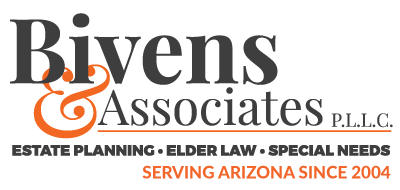My Elderly Parents Moved In With Me. Do We Need a Rental Agreement?
 Yes. If either parent will be paying any portion of their income or assets towards any household expenses (including utilities, water, rent, mortgage, homeowner’s association, insurance, etc.), all parties should enter into a written rental agreement. If your parents ever require any in-home care, assisted living, or skilled nursing, and may require the assistance of government benefits programs such as Arizona Long Term Care System (“ALTCS”) in the future, the existence of a rental agreement will prevent any payments made to the child for household expenses from being treated as an “uncompensated transfer” subject to penalty by ALTCS. Without a written rental agreement, ALTCS may treat payments made from the parent to the adult child as an uncompensated transfer or gift, imposing a penalty of a certain number of months before ALTCS will begin to pay for the long-term care services. A rental agreement will also help defend against a situation in which relatives or others make allegations of financial exploitation.
Yes. If either parent will be paying any portion of their income or assets towards any household expenses (including utilities, water, rent, mortgage, homeowner’s association, insurance, etc.), all parties should enter into a written rental agreement. If your parents ever require any in-home care, assisted living, or skilled nursing, and may require the assistance of government benefits programs such as Arizona Long Term Care System (“ALTCS”) in the future, the existence of a rental agreement will prevent any payments made to the child for household expenses from being treated as an “uncompensated transfer” subject to penalty by ALTCS. Without a written rental agreement, ALTCS may treat payments made from the parent to the adult child as an uncompensated transfer or gift, imposing a penalty of a certain number of months before ALTCS will begin to pay for the long-term care services. A rental agreement will also help defend against a situation in which relatives or others make allegations of financial exploitation.
Rental agreements provide:
- the purpose of each payment,
- proof of payments (not to be counted as a gift), and
- avoid disputes between family members and interested parties. Rent should be equal to or less than fair market rent value.
Signing the agreement: the parent(s) should sign the rental agreement. If incapable of signing, the parent’s agent (or successor agent) under their financial power of attorney should sign on behalf of the parent. This avoids the appearance of self-dealing. The renting child can always refer to the agreement if the parent later has diminished capacity. If there is evidence a parent already suffers from diminished capacity, consult with an elder law attorney who can provide clear advice. If remodeling to safely accommodate the parent’s current and future needs, an aging-in-place specialist may be needed to best modify the home. The agreement can also include the remodeling costs for the parent(s).
A qualified elder law attorney can assist with the preparation of a valid rental or property agreement that will satisfy the requirements of ALTCS, and best fiduciary practices; both you and your parents need the protection of a legal contract. A certified public accountant should be consulted regarding tax consequences of rent paid to the adult child. If your older parent is moving in with you, call our office at 480-922-1010 or email info@bivenslaw.com to schedule your consultation and discuss the options.

